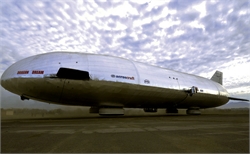Dragon Dream: Difference between revisions
m →Design |
No edit summary |
||
| Line 4: | Line 4: | ||
|caption = Dragon Dream experimental cargo air ship |
|caption = Dragon Dream experimental cargo air ship |
||
}}{{Infobox Aircraft Type |
}}{{Infobox Aircraft Type |
||
|type = |
|type = Experimental aircraft |
||
|national origin = United States |
|national origin = United States |
||
|manufacturer = [[Worldwide Aeros Corp]] |
|manufacturer = [[Worldwide Aeros Corp]] |
||
|designer = Igor Pasternak |
|designer = Igor Pasternak |
||
|first flight = |
|first flight = |
||
}}{{Infobox aircraft career |
|||
|sole example of type?= |
|||
|type = Dirigeable |
|||
|civil registration = N866ML |
|||
|construction date = |
|||
|in service = |
|||
|status = |
|||
|flights = |
|||
|total hours = |
|||
|total distance = |
|||
|fate = |
|||
|preservation = |
|||
}} |
}} |
||
|} |
|} |
||
'''Dragon Dream''' is an experimental [[Aerostat|lighter than air]] (LTA) cargo [[rigid airship]] built by [[Worldwide Aeros Corp]] as a half-scale proof of concept prototype for a design which the manufacturer calls the "Aeroscraft".<ref>{{cite web|work=[[Flight Global]] |last=Trimble |first=Stephen |url=http://www.flightglobal.com/news/articles/aeros-gains-airworthiness-certificate-for-new-hybrid-390293/|title=Aeros gains airworthiness certificate for new hybrid airship|date=6 September 2013|accessdate=16 July 2014}}</ref> The development and design has been funded by the US government through the military [[Walrus HULA]] and then the "Pelican" projects.<ref name=AviationWeek1>{{cite web|url=http://aviationweek.com/awin/pelican-demonstrator-aimed-airlift|title=Pelican Demonstrator Aimed at Airlift|website=aviationweek.com|last= Sweetman |first=Bill |date=15 October 2012|accessdate=16 June 2014}}</ref> |
'''Dragon Dream''' (FAA registration: '''N866ML''') is an experimental [[Aerostat|lighter than air]] (LTA) cargo [[rigid airship]] built by [[Worldwide Aeros Corp]] as a half-scale proof of concept prototype for a design which the manufacturer calls the "Aeroscraft".<ref>{{cite web|work=[[Flight Global]] |last=Trimble |first=Stephen |url=http://www.flightglobal.com/news/articles/aeros-gains-airworthiness-certificate-for-new-hybrid-390293/|title=Aeros gains airworthiness certificate for new hybrid airship|date=6 September 2013|accessdate=16 July 2014}}</ref> The development and design has been funded by the US government through the military [[Walrus HULA]] and then the "Pelican" projects.<ref name=AviationWeek1>{{cite web|url=http://aviationweek.com/awin/pelican-demonstrator-aimed-airlift|title=Pelican Demonstrator Aimed at Airlift|website=aviationweek.com|last= Sweetman |first=Bill |date=15 October 2012|accessdate=16 June 2014}}</ref> |
||
==Design== |
==Design== |
||
Revision as of 21:11, 10 May 2017
| Dragon Dream | |
|---|---|

| |
| Dragon Dream experimental cargo air ship | |
| Role | Experimental aircraft |
| National origin | United States |
| Manufacturer | Worldwide Aeros Corp |
| Designer | Igor Pasternak |
| Type | Dirigeable |
| Registration | N866ML |
Dragon Dream (FAA registration: N866ML) is an experimental lighter than air (LTA) cargo rigid airship built by Worldwide Aeros Corp as a half-scale proof of concept prototype for a design which the manufacturer calls the "Aeroscraft".[1] The development and design has been funded by the US government through the military Walrus HULA and then the "Pelican" projects.[2]
Design
The hull of the Dragon Dream has a flattened elliptic cross-section.
Buoyancy control is managed by pumping helium gas from the internal gas bag and compressing it into a storage cell, the reduction in lifting volume leading to a loss of buoyancy. The system can vary the airship's lift by 3,000–4,000 lb. The manufacturer uses the phrase "Control Of Static Heaviness" for this technology.
- Specifications
General characteristics
- Length: 266 ft 0 in (81 m)
- Volume: 600,000 cu ft (17,000 m3)
- Gross weight: 36,000 lb (16,329 kg)
Operational history
The airship was completed in 2013 and, after extensive systems tests in the construction hangar, was granted an airworthiness certificate by the US Federal Aviation Administration in September 2013, following which some outdoor tethered trials were carried out. Shortly afterwards it was badly damaged when part of the hangar roof collapsed,[4] and the company sued the US Navy for $65 million in 2015.[5]
References
- ^ Trimble, Stephen (6 September 2013). "Aeros gains airworthiness certificate for new hybrid airship". Flight Global. Retrieved 16 July 2014.
- ^ a b Sweetman, Bill (15 October 2012). "Pelican Demonstrator Aimed at Airlift". aviationweek.com. Retrieved 16 June 2014.
- ^ "Aeros Tests Pelican Variable-Buoyancy Airship " 2013
- ^ Pleasant, Tom (3 February 2014). "Aeros Struggles To Put Airship Concept Into Production". aviationweek.com. Retrieved 16 July 2013.
- ^ Niles, Russ (15 March 2015). "Airship Maker Suing Over Hangar Collapse". avweb.com. Aviation Publishing Group. Retrieved 19 March 2015.
- Warwick, Graham (14 August 2007), "Worldwide Aeros to build partially buoyant civil airship", Flight International, via Flightglobal.com, retrieved 14 June 2014
